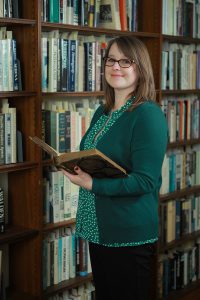History scholar awarded fellowship to write book about female plantation owner during American Revolution
February 6th, 2019 by Christine BillauA history scholar at The University of Toledo has been awarded a fellowship from the National Endowment for the Humanities (NEH) that will allow her to spend the 2019-20 academic year writing the history of Mary Willing Byrd, one of the few women who ran a large plantation in the early American South.
Dr. Ami Pflugrad-Jackisch, associate professor and chair of the UT Department of History, will use the fellowship to complete her book, “The World of Westover: Mary Willing Byrd, Gender, Slavery, and the Economics of Citizenship in Revolutionary Virginia.”

Dr. Ami Pflugrad-Jackisch, associate professor and chair of the UT Department of History
“I was shocked I had never heard of this woman when I first learned her name about 10 years ago, so I am excited by this opportunity to write an extensive study about her life,” Pflugrad-Jackisch said. “Mary Willing Byrd explodes a lot of myths about Southern white women during the revolutionary era. She’s not your typical Southern belle. Byrd believed that she was entitled to the same citizenship rights as white male property owners in the new republic, and she pushed to try and secure these rights for herself.”
Determined to track down and shine a light on Byrd’s story, Pflugrad-Jackisch spent nearly a decade unearthing a paper trail of letters, court cases, property records and tax records. Her archival quest took her to Virginia, Indiana, Pennsylvania, Rhode Island and Michigan.
“There is a stereotype that women slaveholders were more compassionate toward their slaves than men were, but women could be just as brutal as men could be,” Pflugrad-Jackisch said. “Mary Willing Byrd is a fascinating example. A wealthy widow, she ran the Westover plantation for 37 years and was able to pay off the estate’s enormous debts left by her late husband William Byrd III by using slave labor to make her plantation profitable.”
Pflugrad-Jackisch received one of 84 fellowships announced by the NEH totaling $4.6 million. The NEH, an independent federal agency created in 1965, works to serve and strengthen the country and convey the lessons of history by awarding grants for top-rated proposals examined by panels of independent, external reviewers.
“These new NEH grants represent the humanities at its most vital and creative,” Jon Parrish Peede, NEH chairman, said. “These projects will shed new light on age-old questions, safeguard our cultural heritage, and expand educational opportunities in classrooms nationwide.”
“We are extremely proud of Dr. Pflugrad-Jackisch’s award. This prestigious national fellowship was awarded to only 7 percent of the applicants,” Charlene Gilbert, dean of the UT College of Arts and Letters, said. “Her success is a testament to her brilliant scholarship and dedication to her research.”
In her manuscript, Pflugrad-Jackisch makes use of Byrd’s correspondence to Thomas Jefferson and high-ranking military officials during the Revolutionary War, including the Marquis de Lafayette. These letters demand the return of escaped slaves and compensation for property lost when the British army under the command of the traitor Benedict Arnold raided her plantation along the James River, damaging all of her farming equipment.
“This research has been quite tedious because Byrd’s information is often catalogued in archives under the names of men, not her own name, or placed unlabeled in the ‘miscellaneous’ folders. She has a letter in the collection of Thomas Jefferson’s papers, but you have to know it is there to go look for it,” Pflugrad-Jackisch said. “You have to physically go and dig through boxes of male relatives’ business records because Byrd is unlisted. You wouldn’t know they were there. I found 33 of Byrd’s letters in a collection marked ‘Willing Family Business Records’ that only listed the names of her brothers and nephews.”
In her role as manager of Westover plantation, Byrd directed the labor of more than 100 slaves; supervised the plantation’s overseers; sold wheat, barley, corn and tobacco crops; and fended off her late husband’s creditors in court. Her interactions with the state, military and market were out of the ordinary for a woman during that tumultuous time of upheaval.
“Byrd’s world provides scaffolding and a framework for the broader complexities of this era, bundling together the challenges of establishing credit, political loyalty, motherhood and slave management, themes that historians usually explore separately,” Pflugrad-Jackisch said. “This project examines how the remaking of Virginia’s legal, economic and cultural institutions during and after the war laid the foundation for the construction of gendered and racial hierarchies that would come to define women’s citizenship by the beginning of the 19th century.”
Pflugrad-Jackisch’s first book, “Brothers of a Vow: Secret Fraternal Organizations and the Transformation of White Male Culture in Antebellum Virginia,” was published in 2010 by the University of Georgia Press.
Christine Billau is
UT's Media Relations Specialist. Contact her at 419.530.2077 or christine.billau@utoledo.edu.
Email this author | All posts by
Christine Billau

